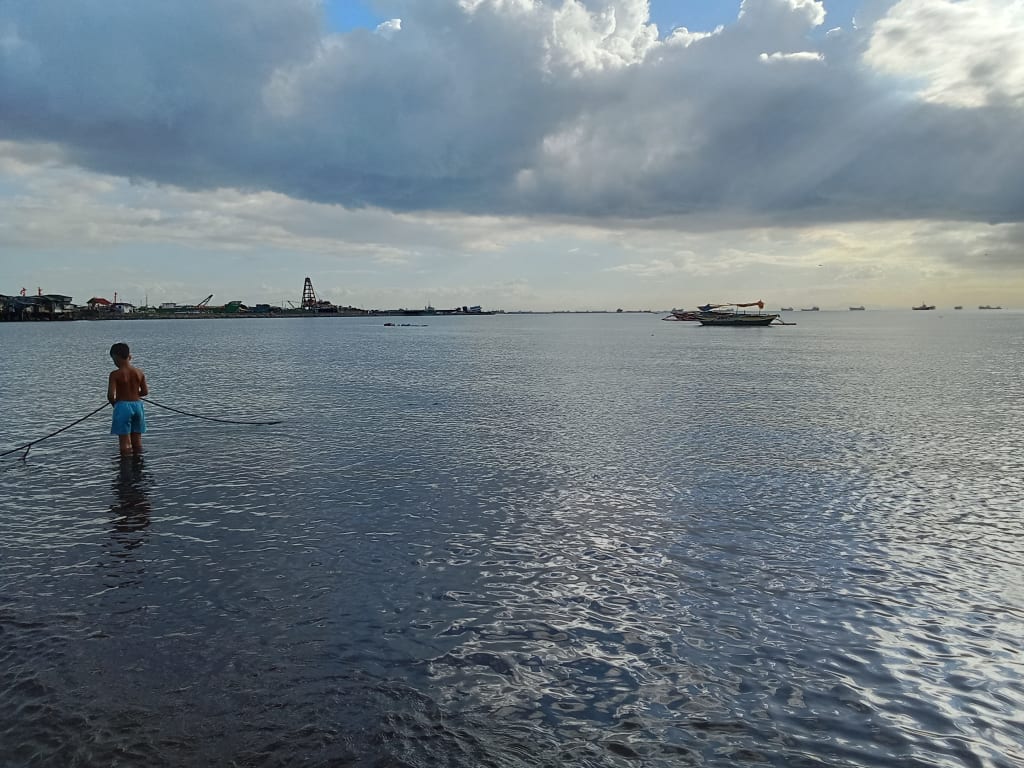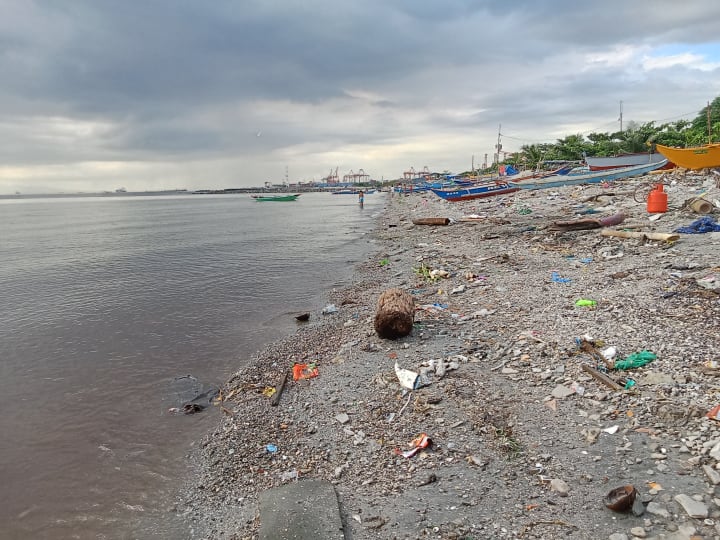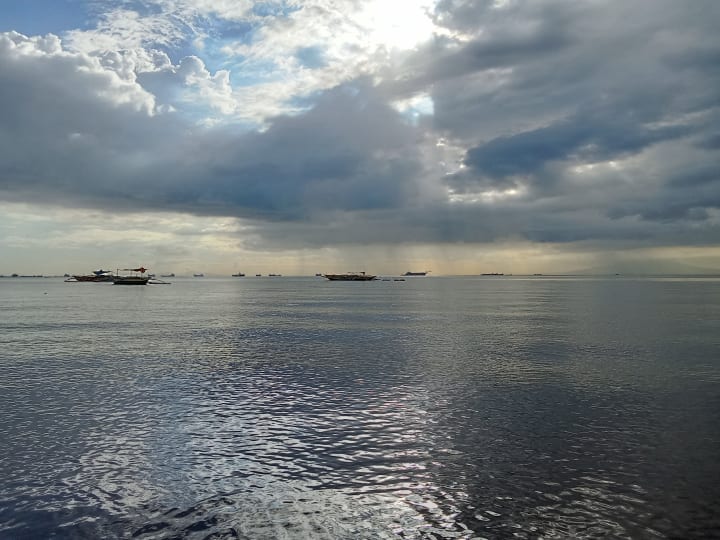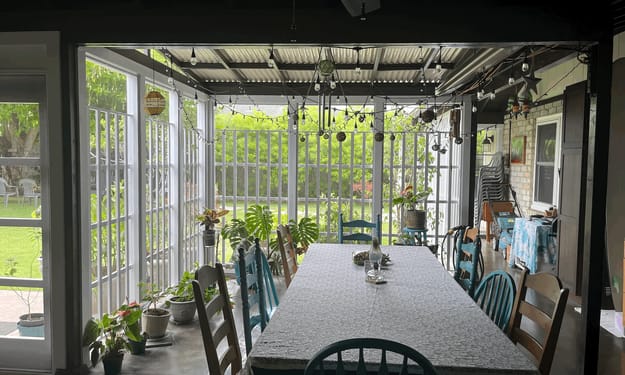Sage of the Port
Not all fishermen have boats, but every one of them has a story to share.

Bordering on the bedlam of sights and sounds that is the city is a small community unseen by many.
Huddled houses, narrow spaces, muddy if not rocky roads, and reeky smells–despite these, the Baseco Compound, a reclaimed section of Port Area, Manila, is home to thousands. It has more than 56 hectares owned by the National Government and is under the jurisdiction of the Philippines Ports Authority. Being one of the most populous urban poor in the Philippines, reaching more than 64,750 people, as recorded in the Philippine Census in 2020, the Baseco community faces numerous challenges that worsen the situation of its residents.
Already tried and tested by time, this is no obstacle to one of its senior residents, Tatay Renato, who’s long been living next to the meandering waters of Manila Bay. Tender in nature, he spoke of his stories with a distant, wizened gaze, as though teaching the young about life’s most valuable lessons.
A Haven of Olden Days
Contrary to popular opinion, the early settlers of Baseco, short for Bataan Shipyard and Engineering Company, were not among the urban poor.
Instead, they were employed by one of the largest shipbuilders in the Philippines. When late President Ferdinand Marcos Sr. was overthrown, many of the newcomers to the island were families who lost their homes due to his clearing operations in Manila. These people built their houses on the lowland using aggregated river silt, rubble from old buildings dumped back then by the Department of Public Works and Highways (DPWH), mud excavated from South Harbor, garbage, and small white shells.
According to Tatay Renato, the White House where Imelda Marcos’s family lived was located at the threshold of Baseco.
Rumors about building an airport had spread at the time, even when the place was already one of the well-known fishing spots in Manila Bay where sailors used to go to eat, sleep, and rest. This plan failed to get the green light due to the People Power Revolution in 1986. However, it was instead replaced by other government projects, which Tatay Renato and other fishermen found to be ‘not fully effective,’ as they did not completely account for the true condition of the people in Baseco.
Sanitation appears to be a major concern in the area, including limited supply of clean water, improper waste disposal, and lack of facilities, which might result in the rampant spread of diseases. Owing to the informal settlement along the coast, water pollution is also an issue. In addition, there is the constant threat of flooding, especially during typhoons and high tides that cause not only damage to properties but also the risk of various types of water-borne diseases.
Moreover, due to the lack of opportunities to find formal employment, Baseco residents are forced to try other means of livelihood. Some of these are street vending, garbage cleaning, and although the income is small, even peeling garlic.
These limitations perpetuate Baseco's socio-economic vulnerability and hinder their ability to improve their lives. More than anything, the current condition of the community greatly affects the primary occupation here—fishing.

A Fisherman of a Bygone Era
Tatay Renato started fishing when he was only 19 years old.
But now, he no longer has a boat. All he has left is the net he used for fishing.
During the height of the pandemic, Tatay Renato personally witnessed the fish kill that stretched from Manila Baywalk up to Baseco, wherein he caught a ton of fish, talilong (grey mullets), and shrimp. The incident is said to be related to the 'white sand project' or the controversial Dolomite beach, which became an issue as part of the Manila Bay Rehabilitation Program that was launched in 2017.
Based on the senior resident’s narrative, this is the suspected cause of the localized die-off of fish populations. In September 2020, the National Federation of Small Fisherfolk Organization in the Philippines, also known as Pamalakaya Pilipinas, stated on a social media post that the fish kill in Manila Bay is an indication that the sea has been in a bad condition for a long time.
Because of the worsening state of Baseco Beach, Tatay Renato had to move to another job as a welder and electrician at San Agustin Church for him to earn a living in these pressing times. He was forced to work there for almost two decades to sustain the needs of his eleven (11) siblings.
Before giving up fishing, Tatay Renato led the Baseco Sailors' Association (SAMABA) to help fishermen who were facing problems in their work and to take care of the poor in the community. Part of their duties was to raise funds for impoverished and unequipped fishermen. They used their savings to buy them a boat that cost fifteen thousand to twenty thousand (15,000-20,000) pesos before.
However, the current system aggravated the situation of fishermen in Baseco, and in the end, the SAMABA fell apart due to auditing and accounting issues.

Let It Not Become of Time Immemorial
At present, the fishermen whom Tatay Renato used to work with are experiencing the effects of several environmental projects initiated by the government, particularly the reclamation and dredging in Manila Bay.
This is a way to expand available land to accommodate infrastructure developments and other ventures for economic growth as well as population growth. However, it is clear to the senior resident that the land reclamation has only exacerbated the problems of his community. About twenty-five (25) projects aim to reclaim more than ten thousand (10,000) hectares of land of Manila Bay from the city of Navotas to the province of Cavite.
Tatay Renato said that the residents are aware of the possible disaster caused by this but are more concerned about their daily needs, such as the low living wages and employment opportunities and even the threat of eviction from their homes.
The difficulties that he and the other people in Baseco experience are not limited to the waters within its dominion. Similar situations of local fishermen, citizens, and nature can be traced from different parts of the country. Being a fisherman in Baseco, which is the main occupation here, has become a grueling endeavor due to the meager income, the risk of being arrested, and the manifestations of polluted and neglected environments like the rising flood levels.
Despite bearing these burdens in his daily life, Tatay Renato is adamant that he will remain in Baseco. He is confident that the only thing needed in his community is rehabilitation. Along with this, he calls for aid, especially for areas that are in dire straits, and asks for recognition and respect for small fishermen like him. Even now that he no longer has a boat, Tatay Renato cares about the current and future generations who will sail through the ever-changing waters of Baseco.
And thus, the owlish soul of the port goes on to become a vessel of days of yore.
About the Creator
Angela Cantiga
Writing to express, not to impress
Enjoyed the story? Support the Creator.
Subscribe for free to receive all their stories in your feed. You could also pledge your support or give them a one-off tip, letting them know you appreciate their work.






Comments
There are no comments for this story
Be the first to respond and start the conversation.